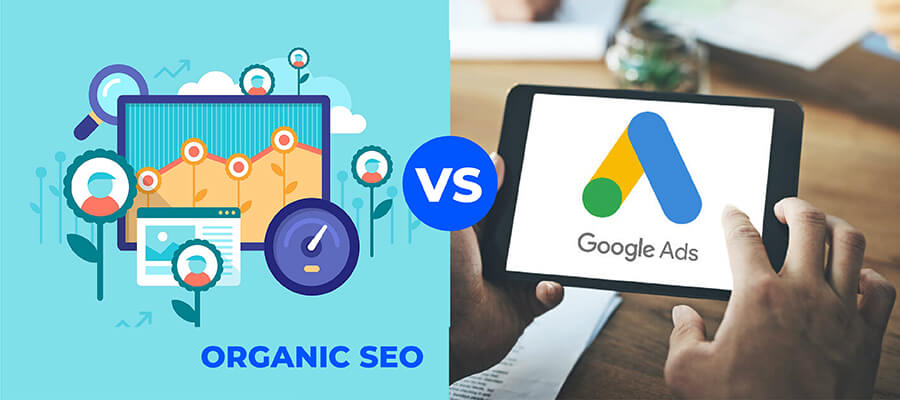- By AlgoPage
- June 9, 2023
Organic SEO vs. Google Ads: Unveiling the Battle for Online Visibility and Success
In the vast digital landscape, businesses strive to gain online visibility and attract customers to their websites. Two powerful strategies often come into play are organic search engine optimization (SEO) and Google Ads. While both aim to increase their online presence, they operate differently and offer unique advantages. This blog post will dive deep into the battle between organic SEO and Google Ads, exploring their key characteristics, benefits, and when to use each approach.
Organic SEO, as the name suggests, focuses on optimizing a website’s content and structure to rank higher in organic search engine results. This process involves various techniques such as keyword research, on-page optimization, link building, and creating high-quality, relevant content. The goal is to improve the website’s visibility and attract organic traffic without directly paying for ad placement.
On the other hand, Google Ads, formerly known as Google AdWords, is an advertising platform offered by Google. It allows businesses to display ads on search engine result pages (SERPs), websites, and various Google platforms. These ads appear at the top or bottom of the SERPs, marked as “Ad,” and are triggered by specific keywords and targeting options. Unlike organic SEO, Google Ads is a paid advertising model, where businesses bid on keywords and pay when users click on their ads (pay-per-click or PPC).
Let’s delve into the advantages of each strategy, starting with organic SEO. One of the primary benefits of organic SEO is its long-term sustainability. Once a website achieves a higher ranking in organic search results, it tends to maintain that position, resulting in a continuous flow of organic traffic. Organic search results are also perceived as more trustworthy and credible by users, which can lead to higher click-through rates and conversions.
Furthermore, organic SEO allows businesses to capture a broader audience by optimizing their website for relevant keywords related to their products or services. By aligning their content with user search intent, businesses can attract highly targeted traffic that is more likely to convert into customers. Additionally, organic SEO helps build brand authority and establishes a strong online presence, enhancing brand reputation in the long run.
Conversely, Google Ads offers several compelling advantages for businesses seeking immediate results and targeted visibility. First and foremost, Google Ads provides instant visibility on the SERPs. Unlike organic SEO, which requires time and effort to improve rankings, Google Ads places your ads prominently at the top of search results, increasing your chances of attracting clicks and driving traffic to your website.
Another advantage of Google Ads is its unparalleled targeting capabilities. Businesses can choose specific keywords, demographics, locations, and even the time of day to display their ads. This level of control enables precise targeting, ensuring that ads are shown to the most relevant audience. Additionally, Google Ads provides robust analytics and tracking tools, allowing businesses to measure their return on investment (ROI) and optimize their campaigns for better results.
Despite their strengths, organic SEO and Google Ads are not mutually exclusive strategies. In fact, they can complement each other to achieve even greater results. For instance, businesses can use Google Ads to generate immediate traffic and conversions while simultaneously working on their organic SEO efforts to improve long-term visibility. By leveraging both strategies, businesses can dominate the search engine landscape, occupying paid and organic search results.



